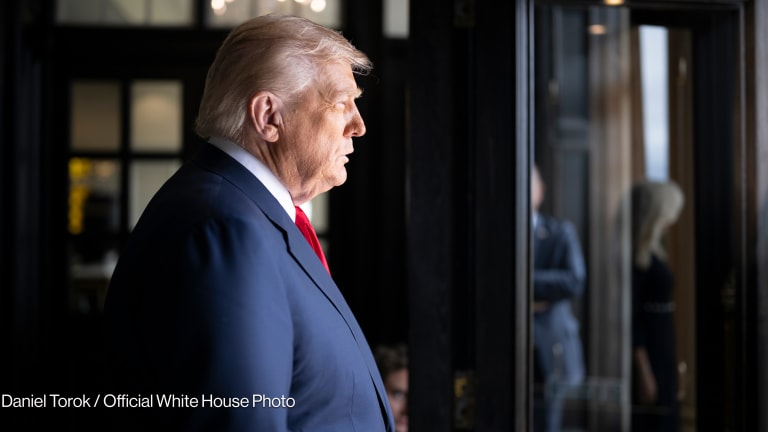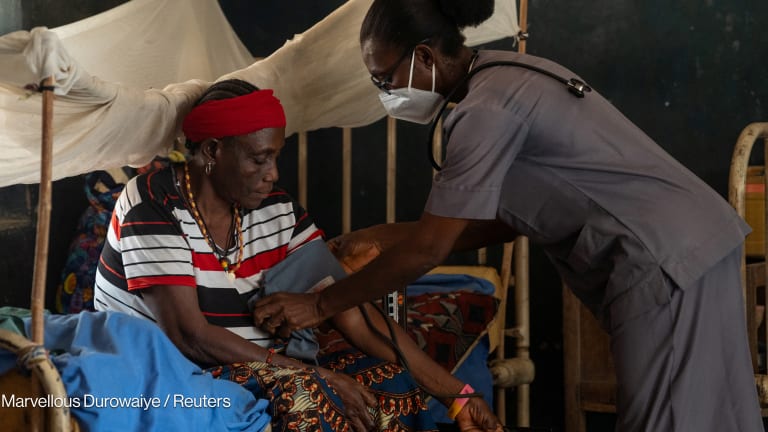
The United States President's Emergency Plan for AIDS Relief, private sector engagement and food aid may all be winners, or at least not losers, in the incoming Donald Trump administration, according to a group of Republican aid professionals who spoke with Devex.
Many Republican aid professionals were surprised by Trump’s victory and acknowledged the nervous uncertainty that is now percolating through the development sector. But those who spoke with Devex cautioned against fear or hyperbole and had some recommendations, too: wait and see how policy will unfold, and depend on and shore up congressional support.
Many current concerns may be unfounded, said Tony Fratto, a partner at Hamilton Place Strategies, a public affairs consulting firm that has worked in the White House and the U.S. Treasury Department. Fratto said that when former President George W. Bush was elected there were worries about what his administration would mean for the development community and many were pleasantly surprised that he was willing to support development issues.
“[But] I don’t know that it’s the same kind of situation,” he said, adding that previous Republican administrations had had more of a known policy track record and different views of America’s role in the world, compared to Trump who has never held public office and has previously voiced support for a more “America first” attitude to global affairs.
But thus far aid seems a low priority as the president-elect vets cabinet members and the transition teams start to roll out across different agencies. The transition team has yet to arrive at the U.S. Agency for International Development.
“From what I saw on the campaign, the president-elect is very domestically focused,” said Richard Crespin, CEO of CollaborateUp. “I didn’t see a lot of articulation of a complete foreign policy to this point.”
Nonetheless Devex asked a group of Republicans to share their thoughts on what might unfold in Trump’s administration and provide their recommendations for what they’d like to see the administration achieve.
What could happen
Opinion: Seeing past the shock of the Trump victory
Development professionals and aid workers the world over have good reason to wonder what a Donald J. Trump presidency will mean for their work and careers. In this column Devex President and Editor-in-Chief Raj Kumar explores the likely significant challenges the global development agenda will face as a result of this election.
There is a range of speculation about what programs might be safe, and what might face funding cuts or perhaps be eliminated altogether.
The answers to those questions may not come any time soon. Given funding cycles and the pace of change, things are likely to continue as they are for the next year or two, said Jim Kolbe senior transatlantic fellow at the German Marshall Fund of the United States.
There seems to be a general consensus that PEPFAR, which had a budget of $6.8 billion in the 2016 fiscal year, is likely to continue in this administration — the initiative has long had strong bipartisan support.
It is also able to clearly show effectiveness and present a clear and easy narrative, which will be an asset, Fratto said. PEPFAR and food aid programs have “easy stories to tell and are immediate and tangible” and that will serve them well, he added.
Several people said that another aid program started under Bush, the Millennium Challenge Corp., which received $901 million in appropriations for the 2016 fiscal year, will likely see continued support, in part because it has some strong advocates in Congress.
But, Fratto said, he is not sure that anyone in the Trump administration “knows what MCC is, is an advocate or supporter.”
While some in the development community have expressed concern about the future of USAID, several of the Republicans Devex spoke with said that they don’t think it is at risk.
“Institutions endure,” Kolbe said. “These agencies have a lot of vested interests and a lot of people that support them; that kind of reform in government is tough to do.”
Some have questioned whether the Export-Import Bank and the Overseas Private Investment Corp. will find support in the next administration. OPIC may face a challenge and while Ex-Im is authorized through 2019, vacancies on its board are hampering its abilities to award larger loans.
With many aid programs and agencies likely to face funding pressures, OPIC and others will need to work to make their case to the next administration.
More broadly, efficiency, value for money and market-based approaches are likely to get more attention in this administration, said Nilmini Rubin, the vice president of international development at Tetra Tech.
Recommendations
The new administration has the ability to advance aid programming by looking to put more of a focus on transparency and effectiveness, by continuing to test models such as Power Africa and expanding cooperation with the private sector.
What happens now? 5 questions about US aid under Trump
Donald Trump's victory raises a lot of questions about what U.S. development cooperation will look like under the next administration. Here are five of them.
Some encouraged the Trump administration to take their time in determining aid policy — carefully evaluating programs and funding before determining what to keep or do away with.
“I do hope that people are really thinking about this as an opportunity rather than being dismayed because I think there is a strong case to be made for development assistance,” Rubin said.
Power Africa, is an example of the type of private sector engagement that the next administration can pursue, she said. The initiative, which aims to increase power generation capacity and access to electricity in Africa, brought together a wide variety of government agencies in a coordinated effort to partner with the private sector and leverage private funds to address the challenge. Power Africa has looked to innovations, technology and partnership to achieve progress.
“Certainly the model is exciting and can be taken forward in other sectors and is consistent with general Republican approach for assistance,” Rubin said.
This administration has an opportunity to work more closely with business and civil society and better leverage public dollars by not footing the bill alone, Crespin said.
As part of that the next administration should also put an emphasis on a more rigorous review of the return on investment of different programs. As part of that it should strengthen the quadrennial diplomacy and development review process so that it provides a truly honest look at institutional and programmatic reforms, Crespin said.
A more transparent, effective development program will also require procurement reform, he said. With the rise of new ways of engaging the growing range of actors in development - from grand challenges, to competitions, the procurement process for goods and services needs to be expanded and made more effective, Crespin said.
Fratto also raised the role of private sector engagement and said he encourages the new administration to recognize some of the good work that has been done and look to build on that growth.
“I think that message, the private sector development message, should appeal to this administration and I’d love to see them take that up as a focus of their development policy and foreign assistance policy, but not at the expense of the existing programs,” he said. “I don’t think we’re at a point where we should be cutting back on America’s role in supporting development and global health.”
What the development community should do now
The global development community doesn’t need to sit idly by, it can be educating congressional representatives and shoring up support there, and working to better sell development both to the next administration and to the public.
“I think that we have really focused on doing our work, and high quality work, and we haven’t always spent the same amount of time on developing stories and explaining why our work matters,” Rubin said.
This is a critical moment to frame global development and think of new ways to “connect the dots between actual actions we’re taking and how that helps strengthen American economic interests and national security interests and the real benefit to Americans both in opening markets for U.S. goods and opening up opportunities for U.S. jobs,” she said.
The development community should look at what programs have congressional support and at recent legislative activity as a guide to what will likely resonate going forwards, Rubin said.
Even Republicans who don’t agree with everything Trump has said or proposed should participate in the administration to educate the team on the value of development programs. That means that even some Republican aid professionals who opposed Trump in the election should step up and serve, if asked, several people told Devex.
“We don’t want people who lack appreciation for these programs to come in and run them and not really understand what the value is and what we might be losing if we get rid of them,” Fratto said.
Stay tuned to Devex for more news and analysis of what the Trump administration will mean for global development. Read more coverage here and subscribe to The Development Newswire.








